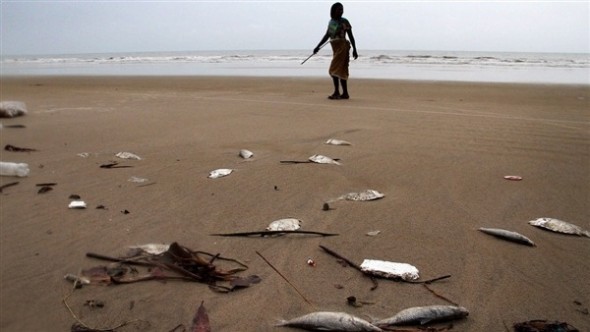
A woman walks past some of the hundreds of dead fish believed to have been killed as a result of the recent oil spill off the coast of Nigeria. Photo: George Esiri/EPA
The 40,000 barrel (1.68 million gallon) oil spill that occured sometime around December 20th at Shell’s Bonga facility 120 km off the coast of Nigeria has not been good for the new year.
Well, I should qualify: it hasn’t been good for Nigerians. Nigeria’s largest offshore spill (as opposed to onshore, where larger spills have certainly occurred) in more than a decade hasn’t made a dent in Shell’s stock price and is only getting minimal media coverage outside the country.
As I wrote a few days ago, Shell announced that clean up crews had “contained” the spill before it hit land. According to the company, clean-up crews, dispersants and nature worked together to prevent the spill from arriving onshore. At the same time Shell reported that clean-up crews had discovered a second spill — one that reached land — having nothing to do with the Bonga oil leak.
Shell continues to deny that the onshore mess has anything to do with the Bonga field spill, but many are doubting those claims. The amount of oil that has washed ashore looks substantial (Euronews has produced a short video report that includes villagers showing barrels of oil they’ve shoveled up: Coastal pollution fears after Nigeria oil spill). Could this really be the result of a passing tanker spill/dump? Shell said the company would analyze the oil on the beach to prove it has nothing to do with the Bonga facility.
Where are those results and when Shell presents them, should we believe what we hear?
On December 28th, the Nigerian publication ThisDay ran a story, Another Spill Ravages Western Niger Delta. Capt. Warredi Enisuoh, an official from the Nigerian Maritime Administration and Safety Agency (NIMASA) is quoted saying that, “Shell cannot confirm or deny the source of the spill until a forensic test of the oil is carried out.” According to the article NIMASA has launched its own probe into the source of the oil on the beaches.
The amount of oil spilled (Shell says up to 40,000 barrels) is also disputed, with some estimating that the spill could be closer to 60,000 barrels. That’s quite a difference. The only people who can give us more details on how much oil actually spilled are Shell officials and so far the company has not released any further information.
Here’s what is certain: there is oil on the beaches and we’re not talking about the creeks of the Niger Delta (there are some inaccuracies in reporting I’ve seen) — this is oil coming in from the ocean. Dead fish are washing up on the beaches. A fishing ban is on and local fishermen are already suffering. Today (January 2) UPI has a brief story on the fishing ban: Fishing suspended after Nigeria oil spill.
The UPI story reports that, “Samuel Ayadi, chairman of a fishermen’s group, the Akwa Ibom chapter of Artisan Fishermen Association of Nigeria, told the News Agency of Nigeria suspending fishing ‘has practically crippled our means of livelihood for over a week now.'”
Although there are large scale fishing operations across the Gulf of Guinea, the vast majority of fishermen in the region are artisanal: individuals or small teams who head out in canoes (pirogues), with or without outboard motors. For the most part, these are not people with savings or back-up sources of income. When they can’t fish, they have nothing.
What is happening in Nigeria now highlights everything that I have been researching in Ghana and the Gulf of Guinea over the past months. A report of my investigation for the Center for Public Integrity will soon be published on iwatch news (www.iwatchnews.org). I’ll provide a link to that article as soon as it appears.
In the meantime, I want to emphasize again that what is happening today in Nigeria can happen tomorrow anywhere in the Gulf of Guinea.
Here are a few links to more information on the Bonga spill.
From Nnimmo Bassey, executive director of Environmental Rights Action in Nigeria and chair of Friends of the Earth International: Shell’s Bonga Bongo (and other beats). This piece puts the Bonga spill and Shell’s (dis)information campaign in the larger context of Nigerian petroleum production.
From MSNBC.COM: Coastal villages in Nigeria protest as oil washes ashore. This article is somewhat confusing, referring to oil in the swamps of the Niger Delta, but it gives details on rising anger in coastal communities.
From Daily Kos, a blogger has assembled information and videos on the Bonga spill and the situation in Nigeria more generally: Misery loves company – multiple oil spills in the Niger Delta.
And Sahara Reporters has a good piece on the extremely problematic media situation on the ground with Shell: As Bonga Spill Hits A/Ibom Shoreline, Environmentalists, Fishermen, Trade Tackles With Shell.
Here’s one brief excerpt: “Shell had selected a team of Lagos-based reporters who were flown to Bonga and handsomely paid to secure favourable reportage of the spill which the company claimed it had contained although oil contamination of the coastline is yet to be addressed. A beneficiary of the largesse who declined to disclose the figure he received said that some of the energy correspondents left out by Shell were making a case to be accommodated in the oil spill bribe-fest which is being spearheaded by the Media Relations Department of Shell.”
